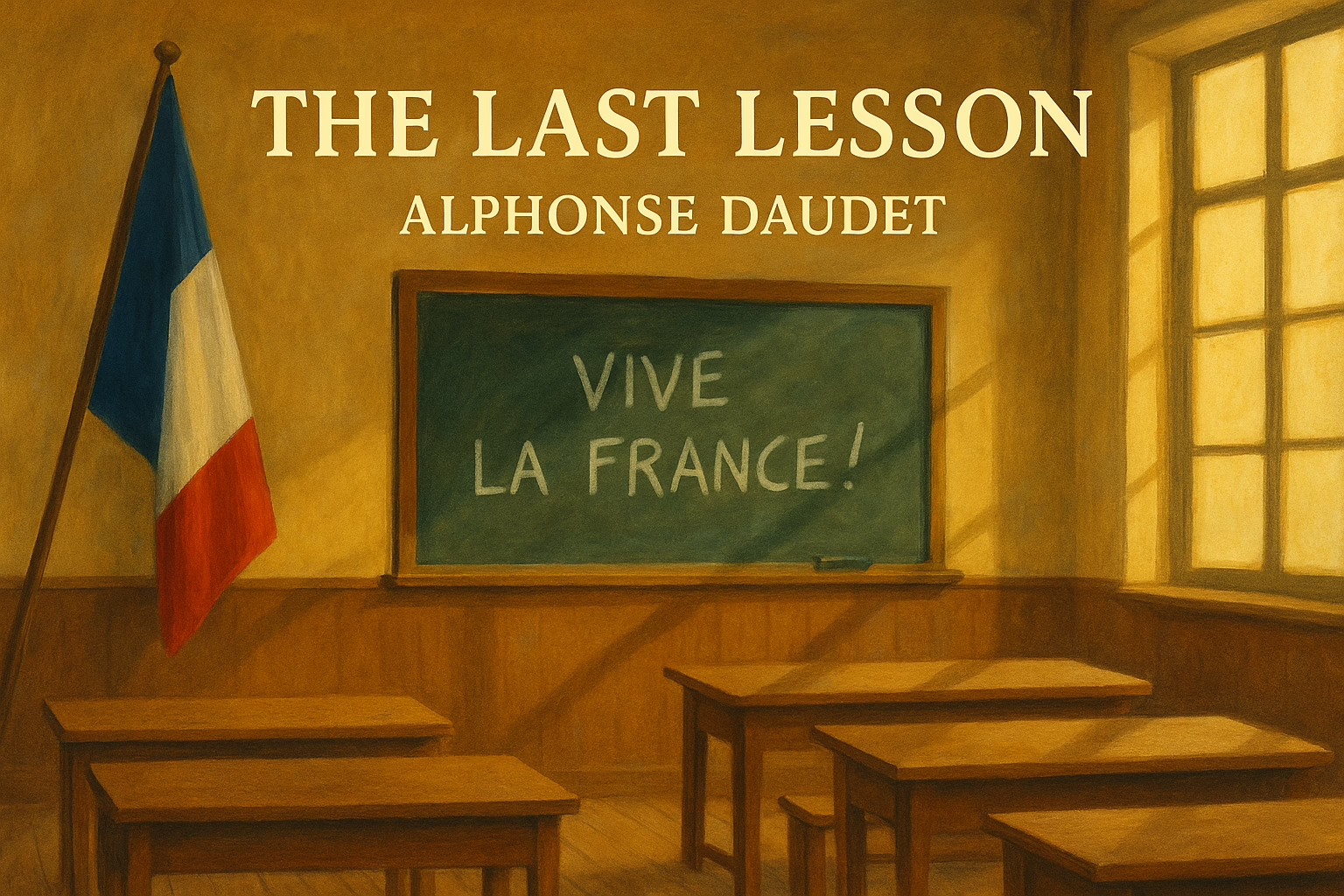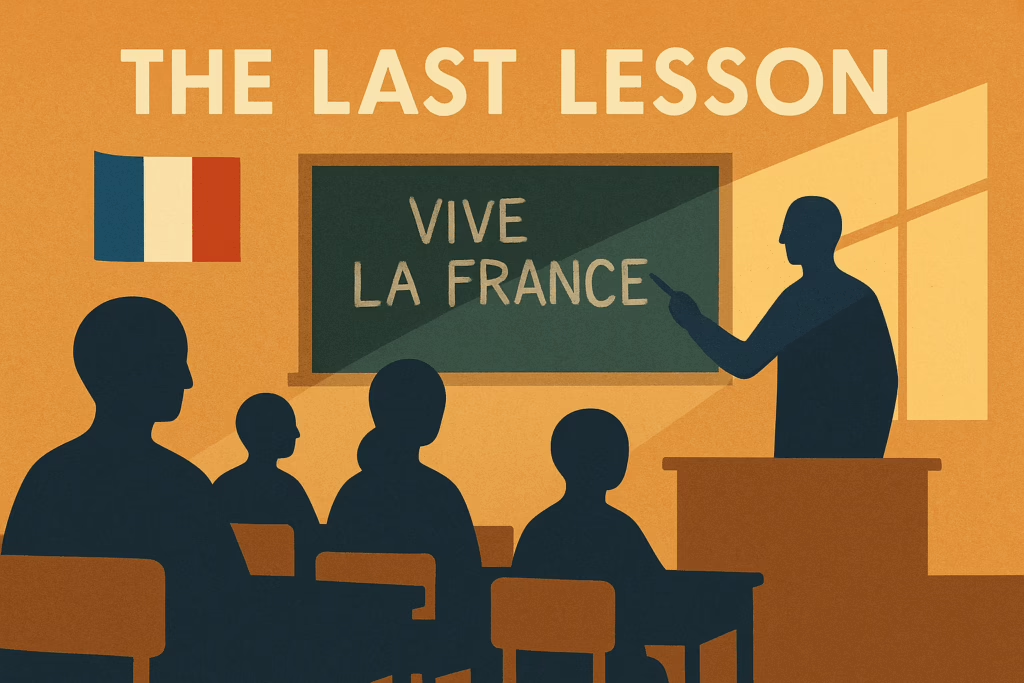Summary of The Last Lesson
“The Last Lesson” is set in the backdrop of the Franco-Prussian War when the regions of Alsace and Lorraine have been taken over by Prussia (Germany). The story is narrated by Franz, a young schoolboy, who is usually careless about studies and afraid of his strict teacher, M. Hamel.
One morning, Franz arrives late to school, expecting to be scolded for not preparing his lesson on participles. However, as he enters the classroom, he notices unusual things: the class is silent, the villagers are sitting on the back benches, and M. Hamel is dressed in his best clothes. Soon, M. Hamel announces that this will be their last French lesson. An order from Berlin states that only German will be taught in the schools of Alsace and Lorraine from the next day. A new German teacher will replace him.
The announcement shocks Franz. Suddenly, he realizes how precious his language is and regrets not learning his lessons earlier. The villagers too have come to show respect for their language, their country, and their beloved teacher.
During this emotional final lesson, M. Hamel speaks about the beauty, logic, and importance of the French language. He blames everyone — himself, parents, and students — for neglecting the mother tongue. The class listens with deep attention as he teaches French grammar, writing, and history for the last time.
Near the end, M. Hamel becomes overwhelmed with emotion. When the church clock strikes twelve and Prussian soldiers return from drill, he writes “Vive La France!” (“Long live France!”) on the blackboard. Unable to speak further, he dismisses the class with a silent gesture.
About the Author — Alphonse Daudet
Alphonse Daudet (1840–1897) was a celebrated French novelist, short-story writer, and playwright known for his warm, sensitive, and often nostalgic portrayal of French life. Born in Nîmes, France, Daudet began his career as a schoolteacher, an experience that later influenced many of his writings, including The Last Lesson. He eventually moved to Paris, where he joined literary circles and worked as a journalist before turning to full-time writing.
Daudet’s stories are admired for their simplicity, vivid imagery, emotional depth, and gentle humour. His works often reflect themes of patriotism, loss, and the beauty of ordinary life. Some of his most famous books include “Letters from My Windmill,” “Tartarín de Tarascon,” and “La Petite Chose.”
Although Daudet suffered from poor health for much of his life, he continued to write with passion and authenticity. Today, he is remembered as one of France’s finest storytellers whose works continue to touch readers with their sincerity and human warmth.

COMPREHENSION CHECK
1. What was Franz expected to be prepared with for school that day?
Franz was expected to be prepared with a lesson on participles, because M. Hamel had said he would question the class on that topic.
2. What did Franz notice that was unusual about the school that day?
The school was unusually quiet and solemn, like a Sunday morning.
No commotion, no sound of opening desks, no lessons repeated loudly.
The villagers were also sitting on the back benches — something that had never happened before.
3. What had been put up on the bulletin-board?
The bulletin-board displayed the order from Berlin stating that only German would be taught in the schools of Alsace and Lorraine from the next day.
Comprehension Check
1. What changes did the order from Berlin cause in school that day?
- It became the last French lesson.
- M. Hamel wore his special Sunday clothes.
- Villagers attended the class.
- The atmosphere was emotional, silent, and serious.
- Lessons were taught with deep dedication.
2. How did Franz’s feelings about M. Hamel and school change?
Before: Franz found lessons boring, avoided school, feared M. Hamel.
After: He felt sorry, regretted not learning earlier, and realized the value of his teacher and language. He suddenly loved his books and respected M. Hamel deeply.
UNDERSTANDING THE TEXT
1. The people in this story suddenly realize how precious their language is to them. What shows you this? Why does this happen?
- Villagers attended the school to honour their language.
- M. Hamel wore his finest clothes.
- Students listened very carefully.
- Old men brought old primers to learn once again.
This happened because it was announced that French would no longer be taught, and they realized they were losing a part of their identity.
2. “Will they make them sing in German, even the pigeons?” What could this mean?
Possible meanings:
- A sarcastic remark showing the extreme control Prussians were imposing.
- Franz’s fear that the conquerors want to erase French completely.
- An expression of sadness: even innocent creatures will not be spared.
TALKING ABOUT THE TEXT
1. Examples of people in history whose language was taken away
- Native Americans forced to abandon their languages in boarding schools.
- Irish people discouraged from speaking Gaelic under British rule.
- Africans under colonisation forced to adopt European languages.
- Tibetans under Chinese rule facing pressure to use Mandarin.
2. What happens to a linguistic minority? How can they keep their language alive?
Problems:
- loss of identity
- fewer speakers
- discrimination
- lack of educational access
They can preserve language by:
- speaking it at home
- forming cultural associations
- running community schools
- publishing books
- celebrating festivals
- protecting it through laws
Examples:
- Punjabis in Bangalore, Tamilians in Mumbai, Kannadigas in Delhi, Gujaratis in Kolkata maintain their languages through community schools and cultural societies.
3. Is it possible to carry pride in one’s language too far? What is linguistic chauvinism?
Yes. Extreme pride can lead to hostility, discrimination, and forcing others to abandon their language.
Linguistic chauvinism = the belief that one’s own language is superior to others.

WORKING WITH WORDS
1. Origins of the words
| Word | Origin |
|---|---|
| tycoon | Japanese (taikun) |
| barbecue | Spanish/Caribbean (barbacoa) |
| zero | Arabic (ṣifr → zefiro → zero) |
| tulip | Turkish (tülbend) |
| veranda | Portuguese (varanda) |
| ski | Norwegian |
| logo | Greek (logos = word) |
| robot | Czech (robota = forced labour) |
| trek | Dutch/Afrikaans |
| bandicoot | Telugu (pandikokku) |
2. Tick the correct meanings
(a) “What a thunderclap these words were to me!”
(ii) startling and unexpected
(b) “as long as they hold fast to their language…”
(i) do not lose their language
(c) “you will get to your school in plenty of time”
(iii) early enough
(d) “I never saw him look so tall.”
(b) seemed very confident
NOTICING FORM
Examples of past perfect in the story:
- “M. Hamel had said that he would question us on participles.”
- “For forty years he had been there in the same place.”
- “The hopvine that he had planted himself…”
- “Our books that had seemed such a nuisance…”
- “I had counted on the commotion…”
Why used?
To show actions that happened before the main events of the story (earlier past within past narration).
WRITING
1. Notice for School Bulletin Board
NOTICE
Inter-School Debate Competition
Date: 20 July 2025
Students of classes XI–XII are invited to participate in the Inter-School Debate Competition to be held in the school auditorium at 10 AM on 28 July.
Topic: “Technology Enhances Human Intelligence.”
Names should be submitted to the English Department by 15 July.
John Doe
— Secretary, Literary Club
2. Paragraph: For/Against learning three languages
Learning three languages in school is extremely useful. It helps students communicate with different groups of people and strengthens national unity. Knowing the mother tongue preserves culture, while learning English opens global opportunities. A regional language helps people integrate with the state they live in. Studies show that multilingual children develop better memory and cognitive skills. Therefore, studying three languages is not a burden but a powerful advantage.
3. A time you changed your opinion
I once disliked a classmate because I thought he was arrogant. He rarely spoke and seemed unfriendly. However, during a group project, I had to work closely with him and discovered that he was simply shy, not proud. He was helpful, polite, and extremely intelligent. My earlier judgement was wrong, and I realised how easily we misinterpret silence. That experience taught me not to form opinions without understanding someone fully.


